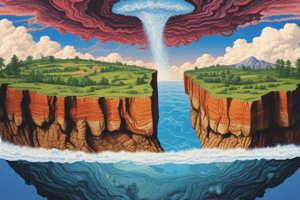Podcast
Questions and Answers
Who proposed the heliocentric theory?
Who proposed the heliocentric theory?
- Nicolaus Copernicus (correct)
- Albert Einstein
- Galileo Galilei
- Isaac Newton
What does the term 'cosmogeny' refer to?
What does the term 'cosmogeny' refer to?
- The study of the universe’s structure
- A symbolic narrative of how the world began (correct)
- A model of how the universe will end
- The exploration of extraterrestrial life
According to the Big Bang theory, what occurred approximately 13.7 billion years ago?
According to the Big Bang theory, what occurred approximately 13.7 billion years ago?
- The Earth was formed.
- Galaxies began to collide.
- The universe experienced a great expansion. (correct)
- Life first emerged on Earth.
What is a singularity in the context of the universe?
What is a singularity in the context of the universe?
Which of the following is NOT one of the modern theories on the origin of the universe?
Which of the following is NOT one of the modern theories on the origin of the universe?
What was the result of the inflationary epoch according to the Big Bang theory?
What was the result of the inflationary epoch according to the Big Bang theory?
Which philosopher is associated with the belief in an atomic universe?
Which philosopher is associated with the belief in an atomic universe?
What does the universe include?
What does the universe include?
What does Earth science primarily encompass?
What does Earth science primarily encompass?
How many days does the Genesis creation narrative state it took to create the cosmos?
How many days does the Genesis creation narrative state it took to create the cosmos?
What concept does the Hindu text Rigveda introduce about the universe?
What concept does the Hindu text Rigveda introduce about the universe?
What was the belief of Greek philosophers Leucippus and Democritus regarding the universe?
What was the belief of Greek philosophers Leucippus and Democritus regarding the universe?
Which philosophers proposed the notion of a geocentric universe?
Which philosophers proposed the notion of a geocentric universe?
What does the term 'cosmogony' refer to in the context of creation myths?
What does the term 'cosmogony' refer to in the context of creation myths?
What aspect of Earth's spheres does Earth science NOT focus on?
What aspect of Earth's spheres does Earth science NOT focus on?
What did Aristotle and Ptolemy’s model of the universe suggest about Earth’s position?
What did Aristotle and Ptolemy’s model of the universe suggest about Earth’s position?
Flashcards are hidden until you start studying
Study Notes
Earth Science
- Earth science or geoscience encompasses all fields of natural science related to the planet Earth.
- It examines the physical, chemical, and biological aspects of Earth's four spheres: biosphere, hydrosphere/cryosphere, atmosphere, and geosphere/lithosphere.
Origin of the Universe: Creation Myths
- Creation myths serve as symbolic narratives explaining the beginning of the world according to various cultures.
- Genesis, from the Hebrew Bible, describes the cosmos being created by God in six days.
- The Rigveda, a sacred Hindu text, depicts an oscillating universe with a "cosmic egg" (Brahmanda) that expands from a point (Bindu) and eventually collapses.
- The Rigveda is a significant ancient Indian collection of Vedic Sanskrit hymns.
Philosophical Perspectives on the Universe
- Leucippus and Democritus proposed an atomic universe composed of indivisible atoms forming various arrangements within an infinite void.
- Aristotle and Ptolemy introduced the geocentric model, where Earth is stationary and everything revolves around it.
- Nicolaus Copernicus challenged the geocentric theory in 1543, proposing a heliocentric model with the sun at the center of the universe.
Definition and Scope of the Universe
- The universe represents the totality of existence, encompassing all matter, radiation, and energy, including stars and galaxies.
Modern Theories on the Origin of the Universe
- Key theories include:
- Big Bang Theory
- Steady State Theory
- Inflationary Theory
- Multiverse Theory
Big Bang Theory
- Estimated to have occurred around 13.7 billion years ago, marking the beginning of space, time, matter, and energy.
- Initiated by random fluctuations in an empty void, resulting in a massive expansion or explosion.
Singularity
- A singularity refers to points in space-time (like black holes or the Big Bang) where physical laws cease to apply.
- All matter and energy in the universe were compressed into an extremely small point during the Big Bang.
Events Following the Big Bang
- Inflationary Epoch: Rapid expansion from the size of an atomic nucleus to significant dimensions.
- Formation of the Universe: Continued expansion resulted in the establishment of distinct forces, including gravity and electromagnetic force.
- Basic Elements Formation: Protons and neutrons merged to form hydrogen nuclei, laying the foundation for the cosmos.
Studying That Suits You
Use AI to generate personalized quizzes and flashcards to suit your learning preferences.




